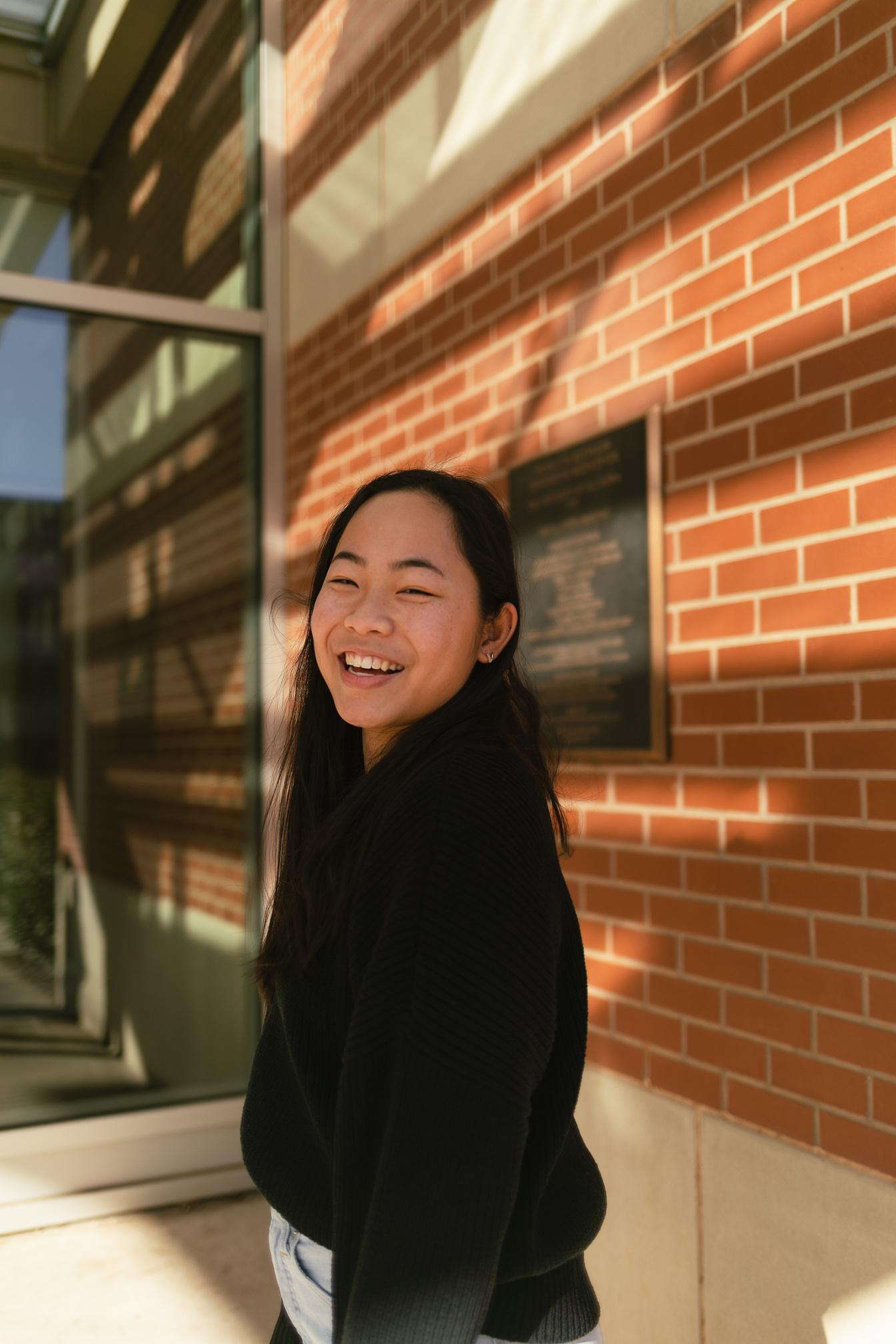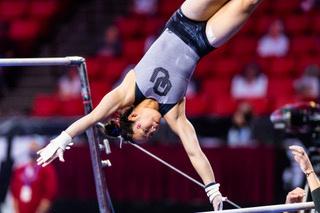
7 minute read
Quinn Smith
Quinn Smith is a 3rd-year Biomedical Engineering major at the University of Oklahoma. After immigrating to America as an adoptee as an infant, she competed at the highest level of gymnastics in a storied 17-year career.
interview by Kaella Glenn and Anthony Nguyen
Advertisement
photography by Emma Nguyen
How did you get into gymnastics?
What brought me into gymnastics is my mom. I think she just wanted me to try all sports. I mean, I did Tee-ball, soccer, swimming, and running club. I also tried Irish dancing, which is one thing no one knows about me. I stuck with gymnastics, and I've done it for 17 years. It just stuck with me, but I was more competitive with gymnastics as a sport. I loved the team aspect, and I loved the feeling of reward when I did it. It's just such a cool sport to watch and it's fascinating to be a part of.
You talk about how your mom introduced you to the sport. Can you talk about the role that your mother had in your process of getting into gymnastics?
I was raised by a single mom; she just wasn't married. I mean, she was married before, but I was raised by just her, which was fine. In fact, it was great! We are really close and when she saw that I enjoyed gymnastics she said, “Well, why don't we just keep doing it?” Though, gymnastics is not the most financially accessible sport to get involved in. It can get really expensive with the outfits, the training… It can be a lot.

There are so many monthly fees that go into it doing the sport, but nonetheless, my mom saw that I enjoyed it, and so she kept supporting me with it since we were both very “go with the flow.” It eventually grew to become more serious and obviously I had huge passion for it. We’d been in it for so long so why would we ever want to be stop? And so she’s always been there to encourage me and support me. I’m thankful for that.
As an adoptee, could you provide some insight into your connection with your Asian heritage?
I'm not super involved with my culture, so while I think it'd be great to dive deeper into my heritage, that’s just how I was raised. I myself am a lot different from other Asians because of my upbringing, so my identity as an Asian American wasn’t my defining factor. This didn’t affect me because it wasn’t what defined me. But since there wasn’t a whole lot of my culture introduced to me when I was younger, it didn’t totally stick, so I don’t feel that sort of disconnect.
Do you think your background affected your personal definition of the term "Asian American?"
In my own opinion, sometimes I feel like I don’t fit in, and part of that is because I can’t relate to most people within the Asian community. Because I didn’t grow up in that kind of household, I would say that the idea of an Asian American feels almost unfamiliar. It is not what I feel like I am.
In terms of the big picture of being Asian American, I probably wouldn’t think of myself, off the top of my head. That doesn’t discourage me from being an Asian American, according to my own terms. My background has shaped me into the person I am today.
You had to retire because you tore your ACL, but do you still keep in touch with gymnastics?
I tore my ACL, which is the stabilizing ligament in my knee. It was a huge injury to come back from and it took nine months. Now, I’m medically retired, but I've still kept up with gymnastics.
I'm still fairly close with everyone on the team. I also carry a close connection with our coaches, trying to stay as involved as I can. This past year, it's been rough with my own schedule, but I do try to keep in touch with everything [as a team manager].
And then, I like watching college gymnastics, which is super fascinating. I want to keep in touch with the sport, and I think it’ll always be a part of me as it defined who I am.
I know your decision to major in Biomedical Engineering was partially rooted in your passion for gymnastics. Could you provide some more insight into this connection?
At face value, gymnastics and biomedical engineering don’t match well. But I’ve always really liked math and science as they’ve been a stronger suit of mine. I tried Chemical Engineering for a bit - kind of jumping around from major to major - until I came across Biomedical. I was able to see the overlap of applied engineering principles to the body and how I could use what I’ve learned from engineering within the field of medicine.
Although both are intertwined for you, do you feel just as strongly passionate about biomedical engineering as you do for gymnastics?
I think I’ve become a lot more passionate about biomedical engineering. Obviously, it’s not gymnastics, and the two are very hard things to balance with each other.
But this past year, I don’t know what I would’ve done if I was as involved with gymnastics as I was in the past. By medically retiring, I’ve been given the opportunity to explore more within my academics while finding what I want to do within biomedical engineering.
I’ve met a lot of new people, and I’ve really gotten into my major. I have a huge passion for it. The two are both very different things, but I’m excited for what’s to come and the opportunities that come with it.
Do you feel that gymnastics has prepared you for the busy schedule that you have as an Engineering major?
I think yeah, for sure! With gymnastics, it took up a lot of my time, being a part of it all throughout my life. I had to be fairly proactive with things like time management and in a way, it’s shaped me into the person I’ve become today. Gymnastics has given me a lot of traits to succeed within biomedical engineering. And while I get it’s a tough schedule to work with, I think for sure that my background in terms of balancing time and disciplining myself has made navigating my degree much easier.
So that competitive mindset has spread from your gymnastics career to your academic career?

I'm a competitive person. And I definitely think that gymnastics has led me to put on those really high standards for myself. I expect a lot of myself, and sometimes it’s too much since I’m a bit of a perfectionist. I wanted to note that my injury made me realize that, "Oh, maybe I’m doing too much," as I had a lot of stress building up on me. I wanted to do well.
But somehow, pushing gymnastics to the side has given me the opportunity to be more outgoing, as I explore the academic side of my retirement.
What does passion mean to you?
For me, it's being able to have a continuous, natural drive that makes you want to pursue something - despite the bumps and rocks in the road. With gymnastics, it’s not an easy sport whatsoever. And a lot of the time, you lose the love for it because the stress is a lot more prominent than the passion.
But I wouldn’t be here if I didn’t have the passion, and I couldn’t continue without it. Of course, there're other factors that can motivate you, but if you don’t have a passion for something, it’s hard to maintain success. I think it’s so rewarding when you have a passion for something, especially when you are able to accomplish big things.

